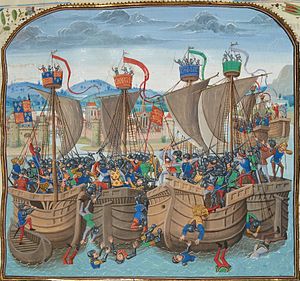Battle of Sluys
| Battle of Sluys | |||||||
|---|---|---|---|---|---|---|---|
| Part of the Hundred Years' War | |||||||
 A miniature of the battle from Jean Froissart's Chronicles, 14th century. | |||||||
| |||||||
| Belligerents | |||||||
| Kingdom of England | Kingdom of France, Republic of Genoa | ||||||
| Commanders and leaders | |||||||
| Edward III of England |
Hugues Quiéret, Nicolas Béhuchet | ||||||
| Strength | |||||||
| 250 ships | Over 200 ships | ||||||
| Casualties and losses | |||||||
| Several thousand. |
20 000 (Europe: A History by Norman Davies) Most ships captured | ||||||
The decisive naval Battle of Sluys (Dutch pronunciation: [slœys], frequently anglicised as /ˈslɔɪz/) was fought on 24 June 1340 as one of the opening conflicts of the Hundred Years' War. It is historically important in that it resulted in the destruction of most of France's fleet, making a French invasion of England impossible, and ensuring that the remainder of the war would be fought mostly in France.
The Battle
The encounter took place in front of the town of Sluys or Sluis, (French Écluse), on the inlet between West Flanders and Zeeland. In the middle of the 14th century this was an open roadstead capable of holding large fleets; it later was silted up by the river Eede. A French fleet, which the English king Edward III, in a letter to his son Edward, the Black Prince, put at 190 sail, had been collected in preparation for an invasion of England. It was under the command of Hugues Quiéret, admiral for the king of France, and of Nicolas Béhuchet, a lawyer who had been one of the king's treasurers. Part of the fleet consisted of Genoese galleys serving as mercenaries under the command of Egidio Bocanegra (Barbavera). Although many English historians speak of King Edward’s fleet as inferior in number to the French, it is certain that he sailed from Orwell on 22 June with 200 sail, and that he was joined on the coast of Flanders by his admiral for the North Sea, Sir Robert Morley, with 50 more. Some in this swarm of vessels were no doubt mere transports, for the king brought with him the household of his queen, Philippa of Hainault, who was then at Bruges. As, however, one of the queen's ladies was killed in the battle, it would appear that all the English vessels were employed.
Edward anchored at Blankenberge on the afternoon of 23 June and sent three squires to observe the position of the French. The Genoese Barbavera advised his colleagues to go to sea, but Béhuchet, who as Constable exercised the general command, refused to leave the anchorage. He probably wished to occupy it in order to bar the king’s road to Bruges. The dispositions of the French were made in accordance with the usual medieval tactics of a fleet fighting on the defensive. Quiéret and Béhuchet formed their force into three or four lines chained together, with a few of the largest stationed in front as outposts. King Edward entered the roadstead on the morning of the 24th, and after maneuvering to place his ships to windward, and to bring the sun behind him, attacked with shower of arrows from the longbowmen on board. In his letter to his son he says that the enemy made a noble defense "all that day and the night after." His ships were arranged in two lines, and it may be presumed that the first attacked in front, while the second would be able to turn the flanks of the opponent. The battle was a long succession of hand-to-hand conflicts to board or to repel boarders. Edward makes no mention of any actual help given him by his Flemish allies, though he says they were willing; the French claim that they joined after dark. They also assert that the king was wounded by Béhuchet, but this is not certain, and there is no testimony save a legendary one for a personal encounter between him and the French commander, though it would not be improbable.
The Aftermath
The battle, which was fought with exceptional ferocity, concluded with the almost total destruction of the French fleet. Quiéret was slain, and Béhuchet is said to have been hanged on King Edward’s orders. Barbavera escaped to sea with his squadron on the morning of 25 June, carrying off two English prizes. English chroniclers claim that the victory was won with small cost in life, and that the losses of the French amounted to 20,000 men, but no reliance can be placed on medieval estimates of numbers. After the battle King Edward remained at anchor for several days, and it is therefore probable that his fleet had suffered heavily.
By one account, none of the French courtiers dared tell King Phillippe VI of the disaster, until finally his jester disclosed it by saying: "Our Knights are much braver than the English", Phillippe replied; "How so?" His jester replied "The English do not dare jump into the sea in full armour".[1]
References
This article incorporates text from a publication now in the public domain: Chisholm, Hugh, ed. (1911). Encyclopædia Britannica (11th ed.). Cambridge University Press. {{cite encyclopedia}}: Missing or empty |title= (help)
- ^ * Otto, Beatrice K., “Fools Are Everywhere: The Court Jester Around the World,” Chicago University Press, 2001, page 113
